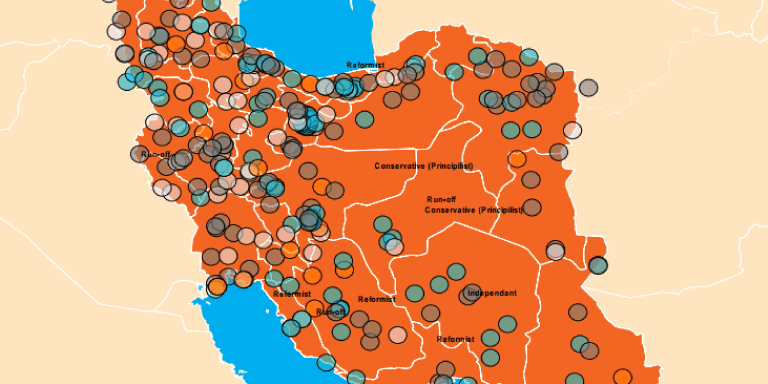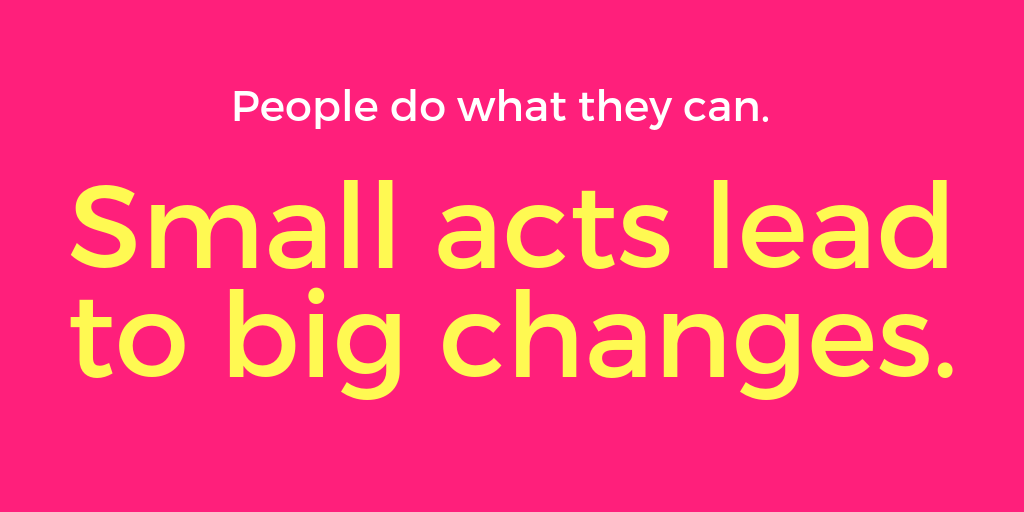
Arseh Sevom in 2017: Letter from the President of the Board
January 23, 2019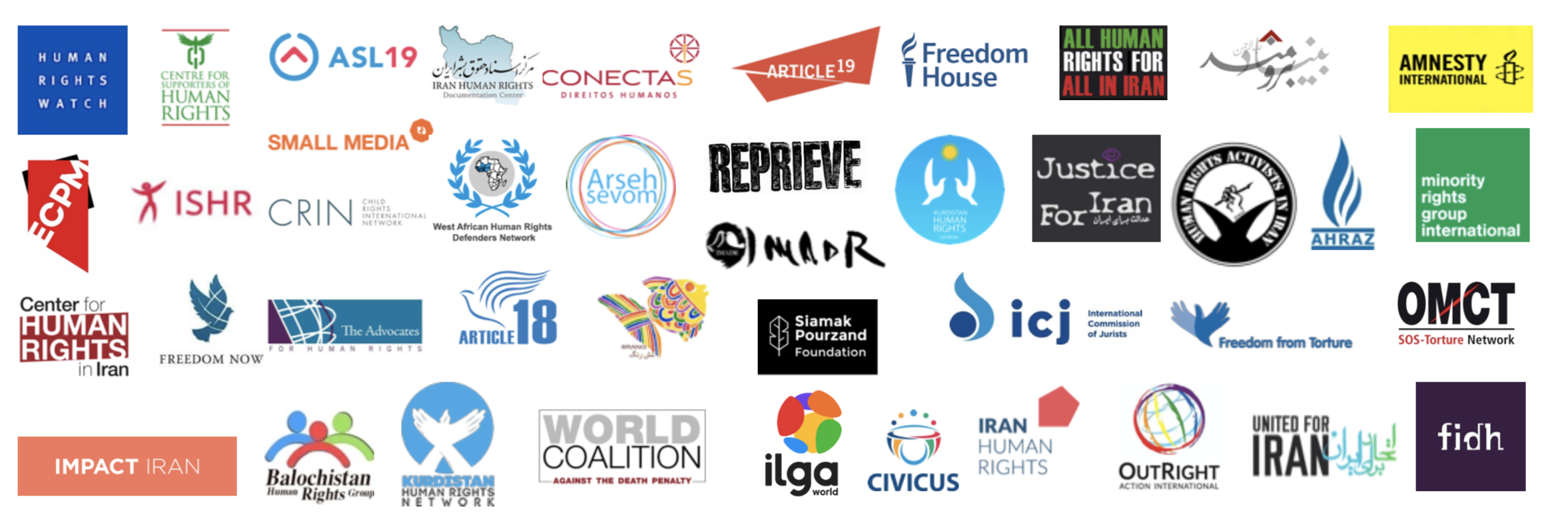
Iranian authorities have consistently failed to adopt and enact legislation and policies that would address core human rights violations
March 18, 2019Who’s afraid of human rights?
The Universal Declaration of Human Rights is a promise to ourselves of what we can become: respectful and respected, peaceful, humane, inclusive and diverse. As a result, it’s the most threatening document ever written. It tells us what we should demand, no matter where we live, no matter when we were born, no matter what religion we practice or don’t practice, no matter what language we speak. We know that we should demand life, peace, education, citizenship, expression. These are our basic rights.
What we are learning is that these rights will not be handed to us. We have to continually struggle to gain them and to hold on to them. That struggle is generational.
The question Arseh Sevom asks every single day is this: How can we center our societies – big and small – on the practice of human rights?
As individuals, we check our own behavior and practice challenging our own pre-conceived notions. We commit ourselves to a life of learning. As an organization, we try to improve our adherence to the values of human rights every day. In our networks, we lobby for more compliance with inclusive and democratic conduct. In our work, we aim to be a resource and tool for expanding human rights practices on local and national levels.
In 2016 and 2017, we worked with our networks to create meaningful content addressing local issues deep inside Iran. Arseh Sevom spoke with people all over the country and in the diaspora, collecting more than 500 concerns. We heard about cultural and identity struggles, the need for clean water, pollution, corruption, and the lack of personal safety. Broadly there were ten major areas of concern from public safety to the environment. We cover these more comprehensively in this report.
The work we did was read, viewed, shared, and downloaded over one million times. This surprised us! It shows that the will to be more democratic is not limited to a small, engaged minority. There is an energy for democratic change shining through the cracks. The desire to engage and be heard is broad and deep.
In the coming years, the biggest challenge will continue to be embedding the value of human rights in every action, communication, and interaction. Those of us stubborn enough will continue to act to fulfill the promise we’ve made to ourselves and our societies: the promise of rights, the promise of dignity, and the promise of peace.
There is a crack in everything,
Kamran Ashtary
Executive Director, Arseh Sevom
Ring the bells that still can ring
Forget your perfect offeringThere is a crack, a crack in everythingThat’s how the light gets in
Leonard Cohen
2017
Arseh Sevom did so much great work in 2017. We continued our work profiling members of Iran’s parliament, reporting on civil society, and diving into issues facing people at the local level.
Here is a quick overview of the important work we did in 2017:
- Arseh Sevom engaged with a network of citizen reporters, mentoring them and publishing their work.
- Arseh Sevom created videos, toolkits, graphics, and posts to enhance the capacity of individuals & organizations to take on leadership roles and to engage with local governance.
- Arseh Sevom profiled dozens of parliament members, exposing corruption and human rights abuses.
- Arseh Sevom and KiesKompas (Electoral Compass) created and published a survey visited by over one million people.
- Arseh Sevom worked with Impact Iran to advocate for human rights in Iran and to improve our own personal conduct within our own networks.
925,837 Pageviews
That’s how many pageviews the Dar Sahn site had in 2017.
642,458 Landed
The most popular part of the Dar Sahn site was the section on local issues, My Council, My Message, which included toolkits, multimedia posts, and citizen reporting.
2,920 Views of MPs’ Profiles
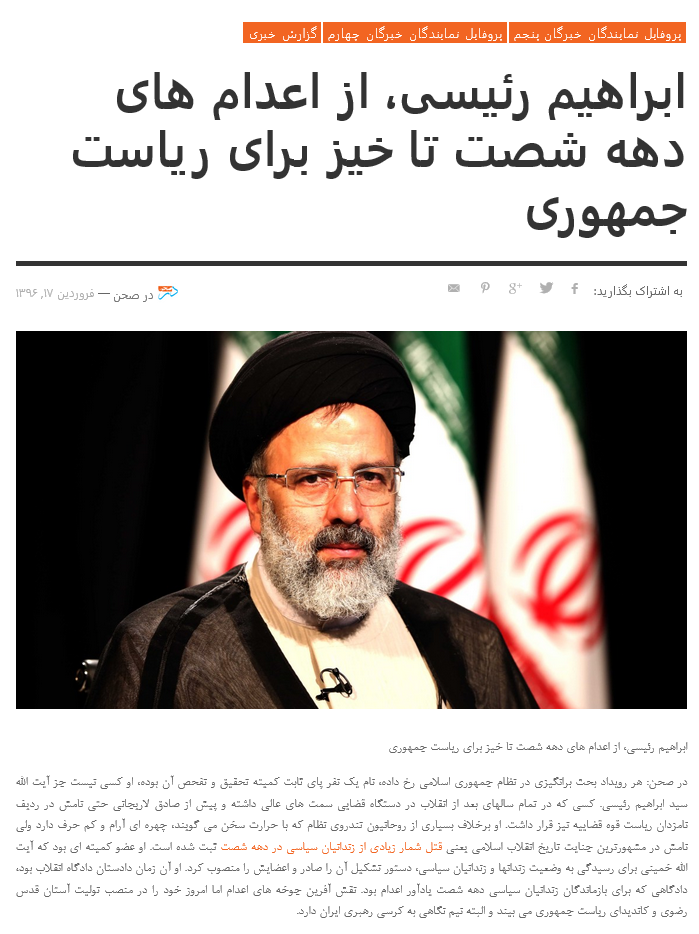
Screen capture of profile of Ebrahim Raisi
The most popular profile on the website was of Ebrahim Raisi, who was running for the presidency of the Islamic Republic of Iran. Raisi is implicated in some of the most grave human rights abuses in the history of the Islamic Republic. In 1988, he was a member of a special panel that ordered the summary executions of thousands political prisoners in Iran.
The majority of those executed were already serving prison terms handed down by the revolutionary courts following unfair trials. Many had never even been accused of violent acts. Others remained in prison despite having served out their sentences years earlier. Still others were nearing the end of their terms. Men, women, and teenagers were executed.
In May, Arseh Sevom joined Impact Iran in bringing attention to Raisi’s crimes in a letter to Federica Mogherini, High Representative of the Union for Foreign Affairs and Security Policy.
500+ Issues Collected
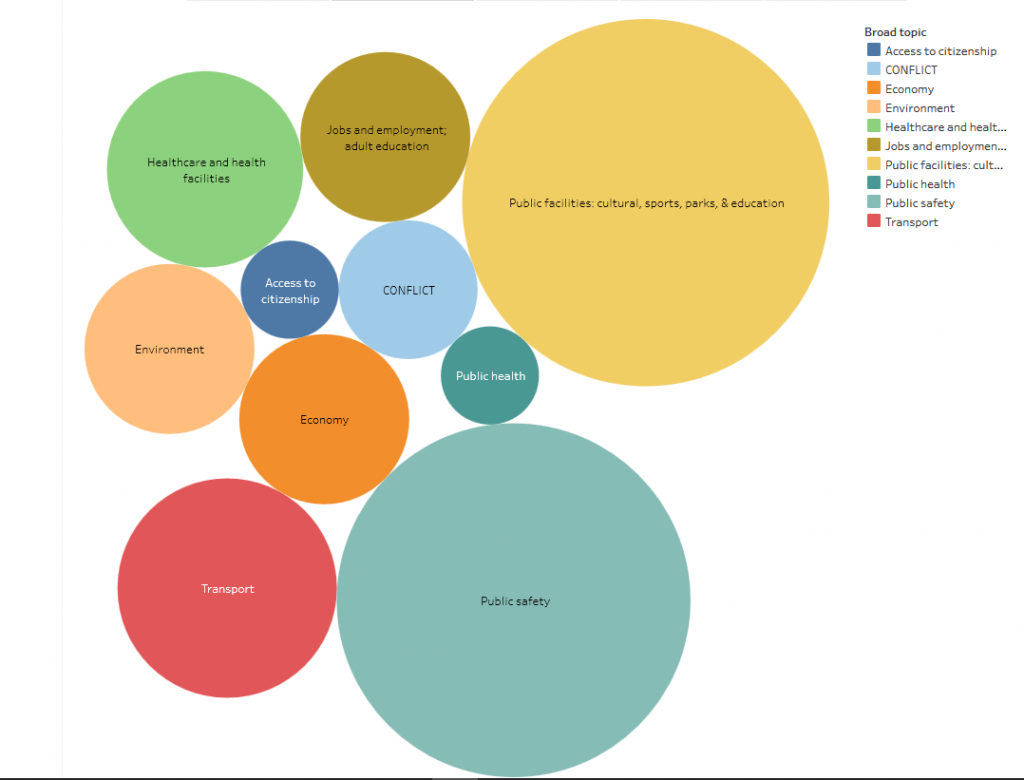
Issues important to people in Iran
“Disabled people are denied the possibility of interacting with society due to the lack of facilities.”
“Unsustainable construction is destroying the local ecosystem.”
“If we are in public alone, we are a target of harassment. Women always need to have someone else with them in order to feel safe in public.”
“There is too much depression and despair among young people”
What issues are people in Iran facing? That’s what Arseh Sevom set out to discover. We collected more than 500 issues from people all over Iran. The respondents had a lot to tell us. Women were worried about the safety of their children while walking to school. They felt unsafe crossing through enclosed pedestrian areas. They wanted more access to public facilities for sport, culture, and education. In Sistan and Baluchestan, women worried about the increase in child marriage. In Lar, women worried about the impact of returning migrant workers disrupting their local culture. In Shomal, women worried about the impact on the environment of unsustainable construction. Both men and women worried about jobs and employment. They both had concerns over water, transportation, and conflict. Men worried about being fairly compensated for their time in military service. The state of the economy was their primary concern.
7 Political Personas

The 7 political personas of Iran
There were seven political profiles designed based on research of trends in Iranian society.
SOCIAL EGALITARIANS have a strong social conscience and believe governments should intervene to make society more equitable. They are socially progressive, support climate action, and want to encourage fair and just local businesses.
PROGRESSIVE COSMOPOLITANS are internationalist in outlook, embracing difference and are politically engaged. They are motivated by social issues such as climate action and the treatment of Afghan refugees. They differ from Social Egalitarians by being less strongly concerned with the redistribution of wealth.
AMBITIOUS OUTSIDERS focus on the future. They like an organized and predictable life, and want their families to have security and stability. They stay away from politics and are unlikely to express opinions about controversial issues.
TRADITIONALISTS believe the world is changing too quickly and would like a return to traditional social values. They value family and are involved in local community. They are likely to support the government on important issues.
LAVISH CONSERVATIVES like luxury and enjoy looking good. They are proud of their country and work with the system for their own gain. They don’t engage politically too much, especially on controversial issues.
POSITIVE SKEPTICS don’t trust the government to solve their problems. They think that politicians interfere, don’t listen and make things worse – and as a result, society has lost its way.
FRUSTRATED CYNICS despair about the direction of society and the country. They feel pessimistic about the future and let down by the community.
20,786 Completed Surveys
Of the more than one million who visited the voting evaluation tool (rayeman.me) designed by Arseh Sevom and Kieskompas, more than twenty-thousand responded. Of those, 89% want more access for people with disabilities. The overwhelming majority want to see better healthcare facilities and a full 44% think that banning refugees from Afghanistan from taking the university entrance exam will make it easier for their own children to gain admittance.
0 Military Reps Elected in Tehran
One of the aims of the Dar Sahn project was to expose increasing militarism in the government. The Tehran City Council was a case in point. From 1997-2017, Iran’s Revolutionary Guard Corp (IRGC) had become increasingly powerful. Over that time , nearly all of Tehran’s civil budget was funneled to IRGC contractors. In a 2004 article, the Persian-language website RoozOnline reported that the contracts made between Tehran’s City Hall and the IRGC were worth 20,000 billion tomans (a bit less than 20 billion USD). RoozOnline also reported that the cash available to the Tehran City Hall during the same time was 7000 billion tomans, which was much less than the agreed payment to the Revolutionary Guard.
In 2017, not a single member of Iran’s Revolutionary Guard Corp (IRGC) was elected to Tehran’s City Council. The first post-revolution city council election occurred in 1997. The fifth in 2017. Up until the most recent elections, the number of representatives of the Revolutionary Guard and Basij had continually increased.
175,302 Engagements
That’s the number of times that people interacted with toolkits and multimedia posts. The topics covered include:
Engaging with local councils:
- How to monitor the city council
- How to make the city council effective
- How to increase civil society involvement in local governance
- How civil society can report election fraud and protest unfair vetting procedures
- How to make council members accountable
- How to take on leadership roles by civil society
- How to engage with local government to decrease corruption and human rights abuses
- What are the responsibilities of city councils and city council members
Local governance and civil society
- Guidelines for running an election campaign
- Sharing the experiences of successful women
- How to deal with political parties
- How to get attention from media
- Communication skills
- Networking
- Providing guidelines for advertising
Minority rights
- Balance of power and the importance of coalition building
- Increased knowledge of political responsibilities
- How to protect the rights of minorities
- How to have powerful voice in local government
Educate youth about local governance and civil society
- How to communicate with citizens
- Guideline for running an election campaign
- Promoting campaign with social media
- Providing guidelines for advertising
12 Citizen Reporters Surveyed
To complete the evaluation of the project, Arseh Sevom spoke to 12 citizen reporters about how Dar Sahn impacted their local community. Here are the highlights:
Summary of Results
Content was shared widely in local areas. The citizen reporters reported that the focus on local issues was quite exciting for many who were not accustomed to seeing their issues reflected in media.
I had a problem: I could not forward even my own articles to others because I worried about being identified. Although my focus was on social and cultural issues, and not political, I still worried. You know the situation of here. It made me happy to see a local activist sharing one of Dar Sahn pieces in a group. I could even see the effect of our style in debates among the candidates. It was a great feeling to see the effect. I felt I was contributing to a project with an impact on my society. The subjects we worked on were important to locals, and in the past no one had paid them serious attention to them. Even though not everyone read our reports, the impact could be seen in demands and slogans. I wish I could have shared our work publicly.
(Respondent S01, Ardebil)
Citizen reporters, who remained anonymous, were quite pleased to see their articles shared on Telegram and in political meetings. This was the case in nearly every province, particularly Tehran, Kerman, Ardebil, Karaj, East Azerbaijan.
In my opinion, the most important effect was writing about the general issues affecting people in this region. This includes everything from traffic to air pollution, civil society campaigns, child labor, prisons, etc. The articles about these issues became quite popular among people. When I say “people,” I am talking about those who were not in my circle and who do not know I work with Dar Sahn.
(Respondent S03, Karaj/Tehran)
In Kerman and Tehran candidates and campaigners used Dar Sahn materials.
Nearly all of Dar Sahn’s reports about Kerman were used in the political debates and meetings of reformists. Usually someone brought the printed version of a report or provided information to others about how to visit the website.
(Respondent M01, Kerman)
Nearly all participants responding to our survey reported that the educational materials created by Dar Sahn were the most used and useful.
A lot of useful articles and educational packages were published on the website but the videos were more popular. I also advised some friends and political activists to visit the website. They liked the content and especially the Educational Packages. Two candidates even told me they used Dar Sahn materials for their activities and empowering their campaign.
(Respondent M01, Kerman)
7 Books Published
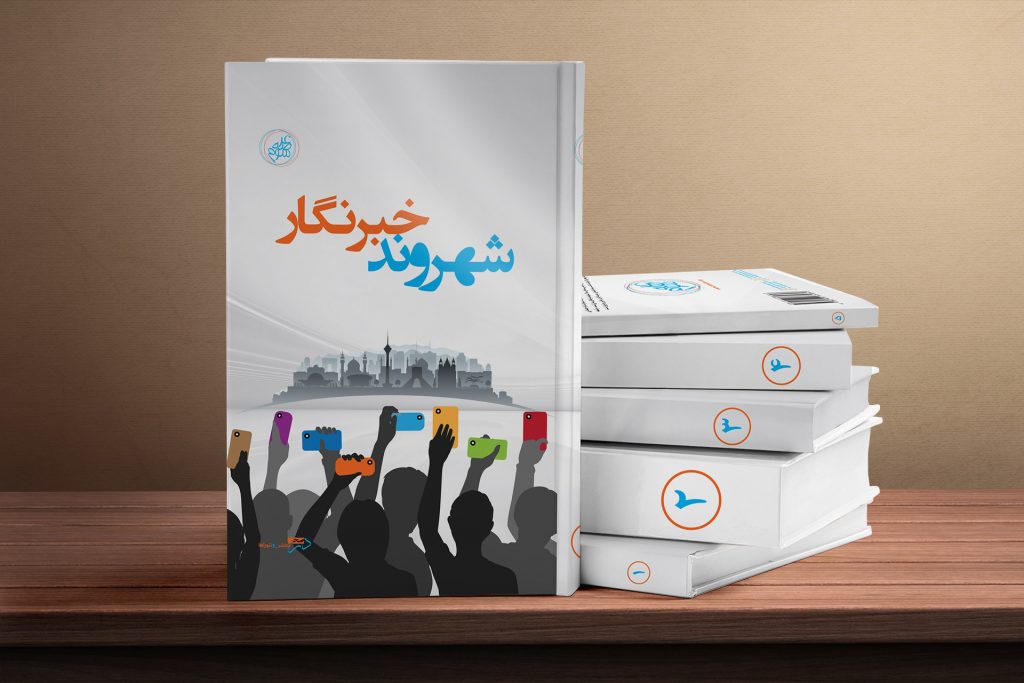
Yes. We were busy.
We know that people share our work in a variety of ways, and we try to package it in a variety of formats to make that easier. Sometimes people receive it via satellite. Sometimes via email and social media. Sometimes the content is even printed and shared. In 2017, we put our most useful content together in seven print-on-demand books.
- Civil Society and City Council Elections
This book examines how civil society can engage with local city council elections, including:
- Encouraging civil society to engage with local governance to promote democratic values
- Making issues important to the community more important to candidates
- Centering and including marginalized communities and minorities
- Learning more about the principles and techniques of campaigning and collective action
- Emphasizing the presence of women and young people in elected institutions.
- Parliament Watch
Where freedom of the press and free speech are challenged, civil society needs to step in to ask the hard questions of government and to demand transparency and accountability. This book looks at some of the following issues:
- Actions and decisions of Iran’s parliament
- Committees and processes
- Ways to monitor and engage with elected officials.
- Citizen Journalism
The Dar Sahn project included citizen journalists from all over Iran. Their articles focused on local issues, and invited readers to help find solutions. The aim of their work was the following:
- To increase engagement with local government
- Surface the needs and demands of the local population
- Strengthen civil society’s capacity to work with local governance
- Highlight the work of women and young people.
- Parliament and City Councils in News and Photos
This was a fan favorite. Our readers enjoyed the photos accompanied by short pieces on the actions of parliament and city councils.
- My City, My Council
This book collects key demands from locals and experts concerning the management of urban areas. It also presents case studies from around the world that demonstrate successful citizen engagement with local councils.
- Women and the City Councils
This book contains a collection of articles, statistics, reports, and profiles arranged in four chapters:
- Women’s participation in elections
- Women and the executive boards of city councils
- Data on women and city councils
- Profiles of women city council members
- Iran’s Governance: Infographics and Charts
Sometimes you need to picture complex processes in order to understand them. That’s what this book does. It visualizes fact-checked data and processes, and includes:
- 44 infographics related to the tenth parliamentary elections in 2015
- 93 Infographics related to the fifth edition of the Assembly of Experts on Leadership in 2015
- 44 Infographics for the fifth year of city and village council elections in 2017
What’s Next
In the coming years, Arseh Sevom is undertaking projects that focus on the intersection of society and governance. The overall goal of everything we do is greater respect for human rights and religious freedom and belief, with a particular focus on those subjected to discrimination.
Our aim is to further advance human rights at both the society level and the government level in order to contribute to inclusive democratic societies.
You can help us with a donation. Please and Thank You.
Help us support our contributors, pay our server costs, and keep funding our projects. We need your help to bring rich content to Persian-speaking audiences. Thank you.


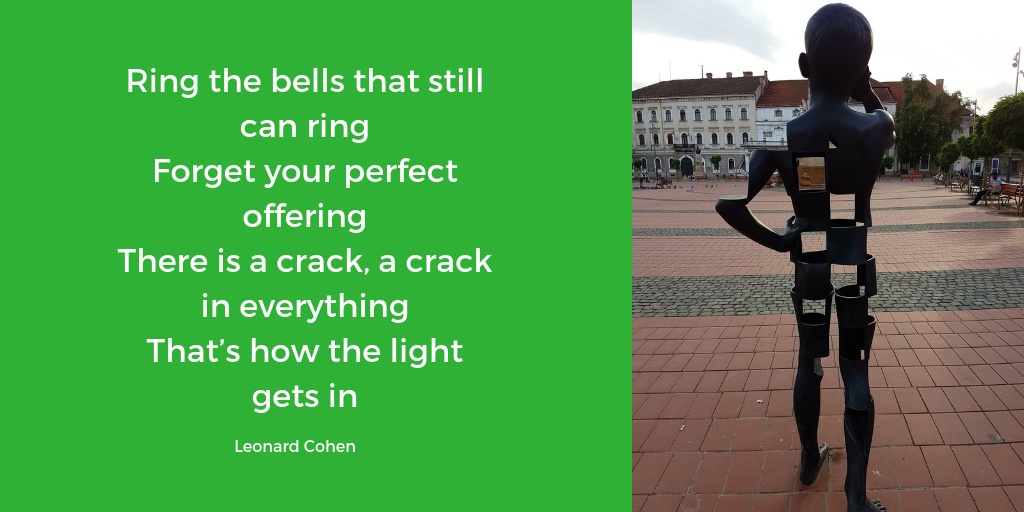
/ARSEH%20SEVOM/Annual%20Reports/Annual%20Reports%202016-2017/AS_2017_annual_report_draft-web-resources/image/kieskompas_participants.png) Ring the bells that still can ring
Ring the bells that still can ring

